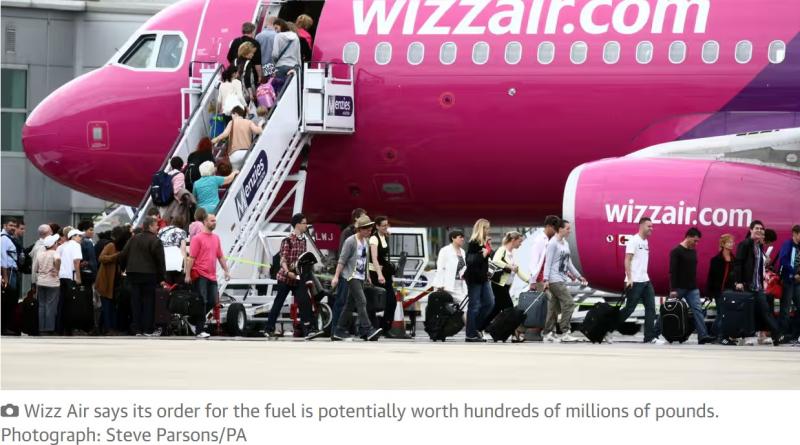UK startup lifts lid on plan to turn human waste into jet fuel

Aircraft could one day take off on fuel made from human waste under plans revealed by Wizz Air and the British sustainable aviation company Firefly to build a commercial refinery in Essex.
Firefly, based in Bristol, said it had developed a process to convert treated sewage into sustainable aviation fuel, or SAF.
The low-cost airline Wizz said it was investing by placing an order – potentially worth hundreds of millions of pounds - for up to 525,000 tonnes of Firefly’s waste-based fuel over the next 15 years.
Firefly has now signed agreements with industrial partners for a pilot refinery in Harwich that would take "biosolids" from Anglian Water and turn it into aircraft fuel. Airlines will have to ensure that a minimum proportion of fuel burned is certified sustainable in the coming decade, with the EU mandating at least 20% SAF by 2035, and the UK expected soon to announce a mandatory 10% by 2030.
There are various ways of making SAF but most are much more expensive than normal kerosene jet fuel, with a limited supply of waste feedstocks such as used cooking oil.
Firefly’s chief operations officer, Paul Hilditch, said converted sewage should be cheaper and more abundant, providing up to 5% of airlines' fuel needs in the UK. The process uses biosolids, the water industry term for the final product in the treatment process. "It’s crumbly – like compost or wet chocolate cake," he said. "There's millions of tonnes of the stuff. And it has no intrinsic value."
The company has produced small test quantities of SAF that he said were "chemically indistinguishable" from jet fuel, with a residue that can be used as a soil enhancer. The fuel is still in a regulatory testing process, and Firefly is still to secure the investment it needs to build a full-scale factory.
However, its chief executive, James Hygate, said it was confident it could be delivering commercial supplies of SAF by 2028-29. He said the first facility in Harwich would serve London airports and there was potential for two more in the UK.
"We’re turning sewage into jet fuel and I can’t think of many things that are cooler than that," he commented.
Wizz Air’s corporate and ESG officer, Yvonne Moynihan, said: “Alongside fleet renewal and operational efficiency, SAF plays a crucial role in reducing carbon emissions from aviation.”
She said Wizz’s investment in Firefly was a "perfect pair-up for a low-cost airline" and the carrier aspired to use 10% SAF across its entire operation by 2030, although it would need "a significant ramp-up of production and deployment".
The UK government has said it expects five commercial plants to produce SAF in the UK to be under construction by 2025. However, campaigners have said even using human waste for aviation was not truly sustainable.
Matt Finch, of the thinktank Transport & Environment UK, said sewage could also be used to make biomethane and there was direct competition for its use: "What's the best use of this biomass hasn't been clarified … It's another conundrum."
About 87% of UK water companies' biosolids are currently spread on farmland. Cait Hewitt, of the Aviation Environment Foundation, said: "It’s not to be sniffed at, given that this is truly unavoidable waste, but not great either given it’s already in use as fertiliser."
She said any test for the carbon credentials of alternative fuels should ask: "Has the producer done something to draw down additional CO2 from the atmosphere? Otherwise it’s nothing near a net zero solution."
Hilditch said the use of biosolids for muckspreading on farms was of low value, and the residue from the sewage-to-fuel process would still be available to improve soil.
Many other countries simply incinerated human waste, meaning that converting it to jet fuel could also have other benefits in terms of efficient disposal, he added. "It's not just the UK of course. Anywhere in the world where there are people, there's poo."



